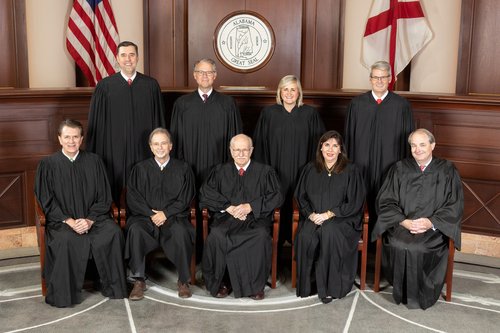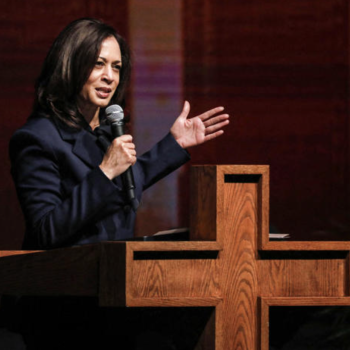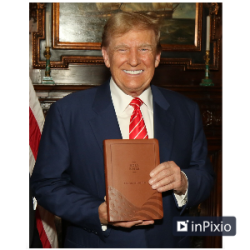
The implications of the recent Alabama Supreme Court ruling on the legal child status of frozen embryos are not only anti-child, anti-family, and anti-science, but they may also constitute a form of legalistic Christian heresy, not to mention antidisestablishmentarianism. (I’ve always wanted to use that word in this column!) In a concurring opinion, Chief Justice Tom Parker relies on a Christian Nationalist dominionist theology to imperil many Alabamians’ only path to parenthood.
My History With Alabama’s Parker Court
Back in 2005, I said it was more like being in church than being in the U.S. Supreme Court. Sitting in a straight-back tufted wooden chair inside a stately conference room adjacent to the High Court’s main chamber, I listened to Justice Clarence Thomas deliver more of an impromptu sermon than a judicial lecture. Even though somebody offered a prayer from the podium, this gathering was no worship service. Instead, it was the swearing-in of a state supreme court justice, not just any state supreme court justice.
Before I explain this highly unusual exercise, it’s important to note that such a proceeding is rare. It’s not typical for the U.S. Supreme Court in Washington to host the swearing-in of a state jurist. Usually, a state’s chief judge or even governor will swear in a state judge at a local or state courthouse or county or state capitol building. So, not only was this ceremony unusual, but it was also secret. The new judge himself told me not to say anything about it publicly.
Why did U.S. Supreme Court Justice Clarence Thomas clandestinely swear in a state judge? Well, there’s a simple and more complex answer to that question.
The simple answer is that the state judge asked Justice Thomas to do so. In most state jurisdictions, a newly elected or appointed judge can ask any constitutional officer to administer the oath to them. But, in this instance, the two people involved also knew each other quite well.
Newly elected Alabama Associate Supreme Court Justice Tom Parker was a long-time admirer of Justice Thomas. The two men shared a similar worldview and jurisprudential philosophy. Although derived from almost opposite theological sources, Thomas and Parker strongly believed that judges obtain their authority from God. Moreover, both men also believed God would hold them to account for their rulings from the bench.
Parker, Moore, Thomas Were Once My Heroes
While I see them very differently today, when I sat in that Supreme Court conference room, I celebrated the camaraderie of these two God-fearing arbiters of the law. It was the reason Tom Parker invited me to join him that day. We had met under extraordinary circumstances when his former boss and the former Alabama Chief Justice, Roy Moore, installed a giant Ten Commandments monument in the state’s Supreme Court building.
As a then booster of Moore’s mission, I had literally rolled up my sleeves to lay a lead bead under the base of the 5280-pound granite sculpture as Moore himself piloted a hydraulic lift to lay it in place. I would later go to jail for attempting to block U.S. marshals from forcibly removing it. Parker was then Moore’s advisor and aide-de-camp, dutifully managing logistics, communications, and security.
Ascending the Seven Mountains to the High Court
After the Alabama Court of the Judiciary dismissed Moore from his post for defying a federal court order to remove the monument, Parker ran for an open Supreme Court seat and won. In those days, I considered the low-key Parker the straight man to Moore’s hyperactive showman. I predicted he’d be a more sober version of Moore when he won his seat. I liked Parker and the company he kept. He was a born-again, Bible-believing, socially conservative Christian. He also ascribed to a theological interpretation known loosely as “dominionism.”
Dominionism, in short, calls for the law to codify traditionalist Christian beliefs and impose them on the general public, whether or not they are believers. As I write this column, the current Speaker of the U.S. House of Representatives, Rep. Mike Johnson, is a proponent of this school of thought. Not only so, but a growing caucus of congressional members embrace it. The leading Republican Party presidential candidate, Donald Trump, echoes dominionist ideology in his campaign rhetoric and promises to enforce it should he regain the White House.
Moore, Parker, and, frankly, my worldview in 2005 would eventually become known as the Seven Mountain Mandate, a moniker popularized by author and spiritual “futurist” Lance Wallnau. The mandate ostensibly originated in a divine prophecy delivered to evangelical leaders in the mid-1970s. Over the next 30 years, best-selling books called for biblical literalists to take over seven critical areas of social influence: family, religion, education, media, entertainment, business, and government.
Preaching the Prophecy
I’m sorry to say that for more than three decades, I preached the dominionist message from hundreds of pulpits across the U.S. I challenged my ministerial colleagues, our movement’s educators, denominational church officials, and anyone else with influence or authority within American evangelicalism to use their resources to realize the vision of a re-Christianized America. In doing so, I helped lay the groundwork for the formidable force now known as Christian Nationalism.
For the proponents of dominionism twenty years ago, judicial actors like Parker were gold. First, he was (and remains) a true believer. He didn’t simply give lip service to the doctrine but spoke strategically about incrementally realizing it through the courts. In addition to having Moore, a hero in dominionist circles, as his mentor, Parker was surrounded by other dominionist theorists and strategists. John Eidsmoe was one. A sometimes professor at small, Christian, and arch-right-wing law schools, Eidsmoe was also a colonel in the Alabama State Defense Force, a volunteer militia created by Governor George Wallace.
Parker the Quiet Plodding Prophet
While Roy Moore was a bomb-throwing provocateur, Parker was a relatively low-key congenial plodder. Over the next dozen years, he was on and off the court, winning the race for chief justice in 2018. Throughout his judicial career, and most notably since taking the state’s top post, he reliably but patiently has used his opinions, many of them majority winners, to advance the religious right’s agenda.
Parker’s concurrence with the court’s majority opinion in the embryo case is a breathtaking explication not only of anti-abortion, pro-life Christian theology but specifically of an old-world Calvinistic Reformed understanding of God, humankind, and the state’s obligations under a theocratic regime.
Alabama’s Antidisestablishmentarianism
Whether wittingly or unwittingly, Parker has legally reopened a 500-year-old highly contentious religious debate over Christian doctrine, biblical interpretation, the origin of the universe and humanity, morality and ethics, and the nature and definition of human life. Parker’s writing could even spark controversy over the relative value of certain versions of the Bible and, most certainly, the question of established state religion.
An Unintended Ethical Conundrum?
Most immediately and consequentially, though, the Alabama decision demands the state answer the questions of what it will do with its new legal obligation to treat frozen embryos within its borders as children and what it will do for those whose only path to parenthood is IVF. Another recent Alabama state action criminalized hormonal therapies for children for fear it might enable transitions in gender identity. Still, it now allows for the cryogenic arrest of children at a particular stage of development–and requires they stay that way forever.
Then, of course, there is the question of what to do with embryos whose commercial hosts go out of business. Will Alabama negligently allow these embryonic “children” to die as they thaw, or will the state properly take them on as their governmental guardian and, well, then what? (Hint, hint: Once it dawns on Alabama’s majority Republican legislature that maintaining these “children” will start costing the state a lot of money, IVF will likely be outlawed.)
Oxymoronically, Alabama (ostensibly) protects unborn children but scores near the very bottom of states for supporting those children once born–notwithstanding the many biblical imperatives for adequately providing for them. The Bible has a lot more to say about providing food, clothing, shelter, healthcare, and, oh, love and concern for the vulnerable than it does about abortion–and it says nothing about frozen embryos–yet Parker’s opinion treats none of those other topics.
When Evil Appears To Be Good
I see the Alabama High Court’s opinion as consummately cynical–even evil. It affirms a religiopolitical movement’s ideological superiority at the expense of those seeking to fulfill the God-given, universal, and achingly human longing to nurture a child. While it legalistically interprets a worthy public policy to protect some expectant parents from a devastating loss, in contrast, it inflicts that same loss on others because their path to parenthood doesn’t conform to a rigid, sectarian, or even fundamentalist interpretation of particular Bible passages. All the while, states are constitutionally forbidden to maintain an established religion. Still, Tom Parker wishes to establish Calvinistic Reformed Protestant evangelicalism with an antiquated Dutch cultural twist as the official Alabama religion.
As human suffering in Alabama escalates, a revivified theological debate in the context of church-state relations will only exacerbate that suffering.
Post-script: Could Parker’s opinion presage an attack on another commonality between him and his role model, Clarence Thomas? I think so. Thomas has raised the idea of relitigating the 1967 Griswold U.S. Supreme Court decision striking down laws against birth control. Parker’s jurisprudential philosophy (ahem, theology ) would support reinstituting those laws. Alas, that’s a topic for another post!


















